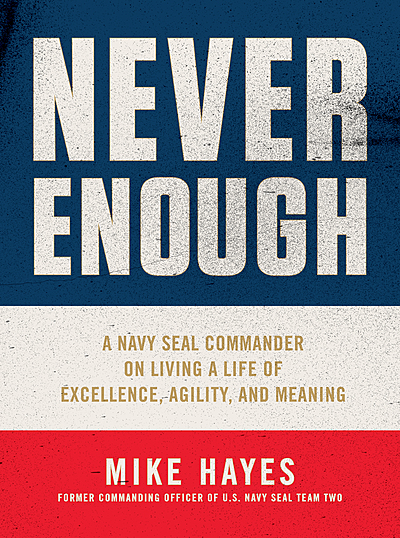I have to start this final chapter with the story of my friend Kyle. Kyle and I were on two deployments together with SEAL Team TEN, and his love for everything Boston made us fast
friends. Our bond only got stronger over the years. When I think of Kyle, I think of his character, his competence, his larger-than- life personality, and I think of Fallujah Surgical, the hospital on Camp Fallujah, our base in Iraq, the first level of care for anyone wounded in the field.
Fallujah Surgical was often a grim place. When there wasn’t enough blood in the blood banks to treat wounded American troops, Camp Fallujah’s loudspeaker would screech: “Anyone with A-positive blood, report immediately to Fallujah Surgical.” On the worst days, the loudspeaker would call for multiple blood types at once. There isn’t much worse than imagining a dying man or woman not having the blood they need to stay alive while you walk around with excess available to give.
One morning, early in the deployment, we finished our operation, returned to our base camp, and finally got to sleep around four in the morning. These were long, exhausting operations. We were beat. What seemed like just a moment later, we all heard the call. The loudspeaker was crying for blood.
In those moments, you want nothing more than to stay under the covers, hiding in bed, hoping and praying that someone else will hear the call first, get up, and go. You tell yourself that sleep is critical—that SEALs need their sleep to maintain operational readiness, that you’re hurting the team if you don’t sleep, that the consequences outweigh the benefits of waking yourself up and trudging to the hospital to sit there with a needle in your arm.
But deep down you know you’re just making excuses. The consequences for you—a little less sleep—don’t come anywhere close to matching the consequences for the wounded soldier who desperately needs your blood. You tell yourself that others will give—and you’re probably right. But what if there aren’t as many people as you think on the base that night? What if no one goes? It’s a collective action problem. What if everyone decides to hide under the blankets in the hopes that someone else will step up?
I hadn’t gone out on the operation the night before this particular call, so I was only one day’s worth of exhausted. This made me relatively well-rested compared to some of my teammates, like Kyle, who were going out on operations every night and riding streaks of poor sleep for days. As soon as I heard the call, I forced myself up and hurried into one of our trucks to rush to the trauma center. I ignored the speed limits—the roads are quiet at four a.m.—and as I arrived, I saw the medical chaos and urgent activity all around me.
I walked into the blood bank, and there was Kyle, already sitting there with a needle in his arm. Somehow, despite days of little, if any, sleep, he had beaten me there by enough time to already be hooked up. I’ll never forget the look we shared as we nodded to each other—I’m tired, this sucks, but I’m here, his face seemed to say, without having to speak a word out loud. Frankly, we were both too tired to talk. Kyle, whose compassion ran so deep, didn’t just give blood that night. He gave life.
Kyle was deployed for ten years straight. On his last deployment, to Somalia in 2017, he was so excited to finish up and return home, to spend more time with his wife, Erin, and their kids. He loved them with the same kind of overflowing passion with which he loved being a SEAL. He had just been accepted to the College of William & Mary to get his MBA—I had written him a tremendous letter of recommendation, because there couldn’t have been a better, more committed, more capable person to do just about anything Kyle might have wanted to do in life—and he was set to start classes just a few weeks after coming home.
Tragically, devastatingly, Kyle was shot and killed on that last deployment, on a raid while he was serving as an adviser to local Somali forces pursuing radical terrorists. I was stunned when I heard the news, and broke down in tears. The world lost an amazing SEAL, an amazing hero, an amazing person. At Kyle’s memorial, I spoke about three things that I knew he understood about the life he had chosen, and that he would have wanted everyone whose lives he had touched to understand as well.
First, he would want everyone to know that he believed so strongly that the actions of the SEALs and of our military as a whole were keeping us so much safer than we would have otherwise been. He knew that putting pressure on terror networks, pursuing them and trying to knock them out, was going to limit how far they could advance and the damage they could do in the world. He knew that his work was keeping them contained as much as possible, and keeping our nation safe. He knew that this was his mission in life, and he felt so strongly about the impact he was making on the world.
Second, he would want everyone to realize how important it is to contribute and fight, whether in our armed forces or outside it. He was the poster child for the “Never Enough” attitude, constantly pushing everyone on his team to get better every day, cheering them on with his quick wit and sardonic tone, supporting them however he could. When I talked to Kyle about why he wanted to go to business school, I realized that his ambitions and his model of how we can all impact the world weren’t limited to the SEALs. He understood and recognized how our nation not only needs great SEALs, but also great teachers, doctors, bankers, lawyers, parents, and everyone else who makes this country strong. He realized that we all have to do what our gifts and passions push us toward.
Third, Kyle would tell everyone to give and to love as much as they can. He tried so hard to build up the people around him, to do the hard thing when no one was looking, and to treat everyone around him with the utmost respect. Kyle never missed an opportunity to help a friend or a teammate in need.
I think about Kyle almost every day and try my very best to live up to the example he set. I thought about Kyle when I started writing this book, and I wondered if “Never Enough” was the right way to characterize the mindset with which I’ve tried to live my life, and with which Kyle certainly lived his. Was it too negative to imply that we could never be enough, do enough, invest enough of ourselves? I don’t think so. I think we can simultaneously recognize how much we accomplish each day and also understand that our work is never done. There is always growth possible for each of us, ways we can push ourselves to be more excellent, more agile, and infuse our day-to-day with more meaning. There are always more people whose lives we can touch, more people we can lift up and inspire to get better and reach greater heights. It’s easy to be complacent. It’s harder to keep on figuring out the work we need to do. But that work is what drives us to our greatest heights. That work is what drives us to make a real contribution to the world—and the truth is that we all want to contribute, because that’s what makes any of us feel fulfilled.
You will find more incredible advice, insights, stories, and inspiration in Never Enough: A Navy
SEAL Commander on living a life of Excellence, Agility, and Meaning.



